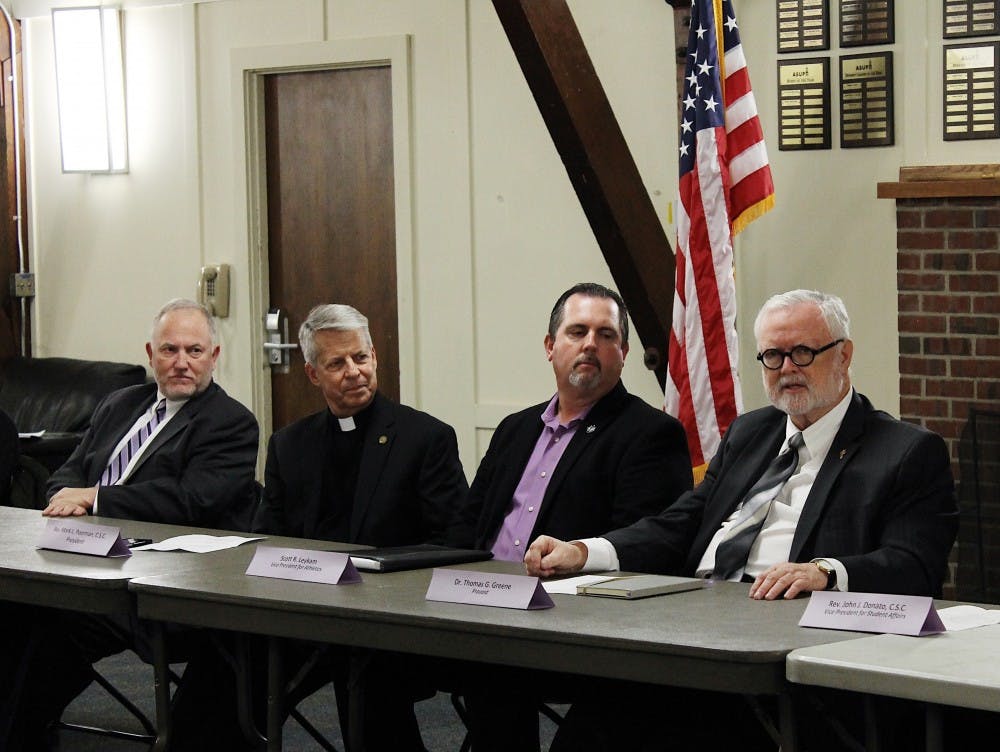After a month and a half of turning students away for lack of a nurse practitioner on campus, the Health and Counseling Center will have an interim nurse practitioner starting Tuesday, Nov. 14. The announcement came at the ASUP Senate meeting on Monday night.
Two permanent nurse practitioners have been hired for the upcoming spring semester, according to Pamplin School of Business Senator Molly Rausch, who met with Health and Counseling Center Director Carol Dell’Oliver and delivered a report about the status of the Health and Counseling Center to the Senate.
University President Fr. Mark Poorman also held a forum at the meeting, along with the President’s Leadership Cabinet, including Vice President of Financial Affairs Alan Timmins, Vice President of Student Affairs Fr. John Donato, Assistant Provost and Title IX Coordinator Lauretta Frederking and Provost Thomas Greene. The cabinet answered three questions from the Senate that were asked to be sent ahead of time, on topics like Title IX, core curriculum changes and diversity on campus.
Frederking addressed the campus’ Title IX guidelines in the wake of Betsy DeVos’ announcement in September. She said that, for the moment, nothing about the University’s Title IX procedure will change, as the current system is following all federal guidelines.
Frederking said that she, Associate Director for Community Standards Sarah Meiser, Director of Public Safety Gerald Gregg and Wellness Education and Prevention Provider Tiger Simpson have been coordinating with hall directors to organize meetings in the dorms to “convey clearly that their policies and procedures have remained in place.” Frederking told The Beacon that the attendance in Villa Maria and Christie Hall were among the largest crowds of all her meetings.
“Title IX is a floor and we want to go beyond that floor in protecting students,” Frederking said to the Senate. “Join us as we work hard to make this campus safe together.”
Frederking also said that after this week, she will have met with all sports teams, coaches and administrators to educate them and answer questions about Title IX resources and procedures. This is an implementation of the new NCAA sexual violence policy that requires college athletes and athletics administrators to complete education each year in sexual violence prevention.
Greene answered a question about evaluating and possibly diversifying the university core curriculum.
“The timeline is still a little bit ambiguous but we know definitely we won’t have anything before 2019,” Greene said, stressing the fact that the University is in no hurry to make these changes.
Frederking mentioned how the University has already met with the Black Student Union and the Feminist Discussion Group to get ideas on diversifying the core curriculum.
There will be a more official core curriculum group announced in January, and Greene said there will be student representation in the group, but it was not clear how many students would be involved. Greene said that any core curriculum change would not apply for current students.
“You guys will get to graduate with the bulletin you arrived on campus with, but there is some opportunity for the folks after you,” Greene said to the Senate.
Senator Sitara Nath asked a question directed at Director of Human Resources Sandy Chung about the University’s efforts to diversify hiring pools, citing the objectives in the University’s Vision 2020 initiative announced in Sept. 2016.
“The law says that you can’t choose faculty and staff based on a protected status,” Chung said, explaining hiring processes. “You can’t just choose someone based on race, gender, ethnicity or sexual orientation.”
Because of this, Chung said the University has further extended its hiring outreach to publications with more diverse readerships, in hopes that applicant pools will include people from more diverse walks of life.
Additionally, Chung explained, the University has moved away from evaluating applicants based solely on resume and traditional qualifications — understanding that some applicants may be fit for the job without having extensive traditional experience in the field.
Now, applicants are invited to present a project to demonstrate applicable skills and experience for their fields. Chung said that this should allow a more diverse variety of applicants to shine and to be considered for positions at UP.
“Students who come here want to see others like them in terms of role models,” Greene said.
The University made progress in this regard earlier in 2017, hiring five women engineering professors, boosting percentage of women faculty members in the Shiley School of Engineering to 33.
Student diversity was also addressed in response to Nath’s question. Timmons expressed a recent effort to expand Native American student populations and said that the Office of Financial Aid is dedicated to helping students of all backgrounds finance their education.
“We are worldwide beings,” Poorman said. “We’re doing it because we believe it leads to a richer educational environment.”









